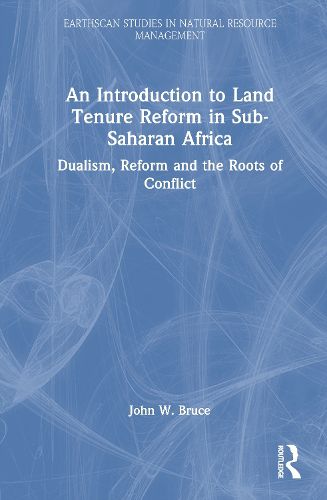Readings Newsletter
Become a Readings Member to make your shopping experience even easier.
Sign in or sign up for free!
You’re not far away from qualifying for FREE standard shipping within Australia
You’ve qualified for FREE standard shipping within Australia
The cart is loading…






Written by a scholar-practitioner with over four decades of experience, this book is an accessible introduction to land tenure and its implications for African development.
The book carries a clear warning: intensifying conflict over land across Africa is not the growing pains of a positive evolution in land tenure, but a problem that can only get worse without the state's recognition of customary tenure systems when undertaking tenure reform. The author reviews Africa's experience of evolution in customary land tenure and the often-difficult experience of the new nation in land tenure reform, including the failure to prevent further loss of land by rural populations and the unwitting contribution of some reform elements to that loss. The book has a broad reach across many countries in Africa and many different types of land, including farmland, pastures and rangelands, and forests. It is complemented by insights from a variety of disciplines to provide an accessible but nuanced introduction to a topic not well understood even in some development circles. While it focuses on Africa, the book is highly relevant to many countries of the developing world that have a common heritage of colonialism and dualistic systems of land tenure.
This book will be of great interest to students, scholars and practitioners wanting to understand the role of law and land tenure in African development.
$9.00 standard shipping within Australia
FREE standard shipping within Australia for orders over $100.00
Express & International shipping calculated at checkout
Stock availability can be subject to change without notice. We recommend calling the shop or contacting our online team to check availability of low stock items. Please see our Shopping Online page for more details.
Written by a scholar-practitioner with over four decades of experience, this book is an accessible introduction to land tenure and its implications for African development.
The book carries a clear warning: intensifying conflict over land across Africa is not the growing pains of a positive evolution in land tenure, but a problem that can only get worse without the state's recognition of customary tenure systems when undertaking tenure reform. The author reviews Africa's experience of evolution in customary land tenure and the often-difficult experience of the new nation in land tenure reform, including the failure to prevent further loss of land by rural populations and the unwitting contribution of some reform elements to that loss. The book has a broad reach across many countries in Africa and many different types of land, including farmland, pastures and rangelands, and forests. It is complemented by insights from a variety of disciplines to provide an accessible but nuanced introduction to a topic not well understood even in some development circles. While it focuses on Africa, the book is highly relevant to many countries of the developing world that have a common heritage of colonialism and dualistic systems of land tenure.
This book will be of great interest to students, scholars and practitioners wanting to understand the role of law and land tenure in African development.